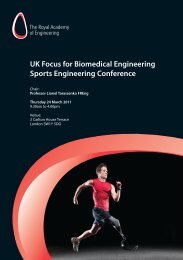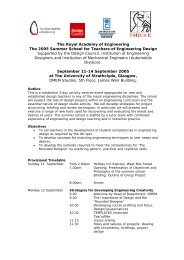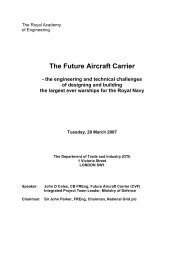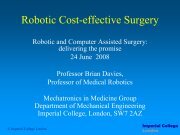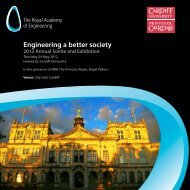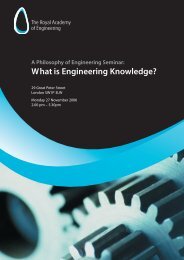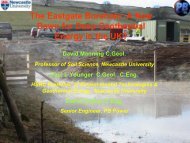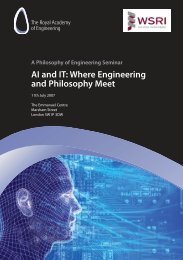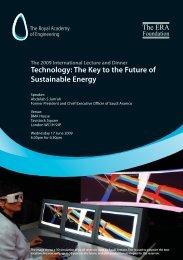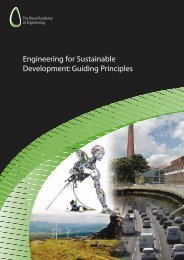Engineering graduates for industry - Royal Academy of Engineering
Engineering graduates for industry - Royal Academy of Engineering
Engineering graduates for industry - Royal Academy of Engineering
Create successful ePaper yourself
Turn your PDF publications into a flip-book with our unique Google optimized e-Paper software.
equipment with consequent benefits <strong>for</strong> engineering teaching, there are serious pressures on more routine expenditure<br />
on lower-level equipment, maintenance, non-academic staff (<strong>for</strong> example, technicians) and generally on non-pay budgets<br />
in academic departments. Exacerbated by the current economic climate, the impact <strong>of</strong> all these cost pressures is<br />
potentially damaging to the quality, relevance, reputation and sustainability <strong>of</strong> UK engineering education.<br />
Exemplar costing<br />
Introducing or enhancing experience-led components almost always incurs additional costs as shown in Table 5 and<br />
Table 6. Set up costs can be significant if they include capital costs and funding <strong>for</strong> these is usually found from external<br />
or university level sources. It should be noted that although recurrent costs <strong>of</strong> experience-led components vary<br />
considerably, all the exemplars demonstrate that <strong>industry</strong> or other sources are <strong>of</strong>ten willing to put money into supporting<br />
them. They also demonstrate the potential <strong>for</strong> greater efficiency through more imaginative and intensive use and sharing<br />
<strong>of</strong> facilities between universities, <strong>industry</strong>, colleges and public bodies.<br />
Whilst the promise set out in Higher Ambitions <strong>of</strong> “enhanced support <strong>for</strong> the ‘STEM’ subjects” is welcomed, further<br />
consideration should be given to the funding mechanisms needed to encourage and enable the development <strong>of</strong> more<br />
experience-led degrees. If new funding cannot be made available, then, in the view <strong>of</strong> the Oversight Group, existing<br />
funding should be prioritised towards the further development and provision <strong>of</strong> experience-led degrees in a manner that<br />
is ring-fenced to encourage and support universities to move in this direction. An approach <strong>of</strong> this nature might result in<br />
a reduction in the total number <strong>of</strong> universities that can <strong>of</strong>fer engineering degrees and an expansion <strong>of</strong> student numbers<br />
in those <strong>of</strong>fering experience-led degrees.<br />
Table 5: Set up costs <strong>of</strong> exemplars<br />
University Exemplar Capital<br />
£M<br />
Coventry<br />
University<br />
1. Activity led<br />
learning<br />
55.00<br />
Other<br />
£M<br />
4.11<br />
Total<br />
£M<br />
59.11<br />
Notes<br />
The capital cost will provide a new engineering building.<br />
Other costs include refurbishment <strong>of</strong> the Built<br />
Environment department and significant staff time to<br />
undertake this faculty wide pedagogical change to activity<br />
led learning, including international fact-finding visits and<br />
staff development.<br />
Imperial<br />
College<br />
London<br />
4. Chemical<br />
pilot plant<br />
5. EnVision<br />
0.60<br />
0.34<br />
0.60<br />
0.34<br />
£0.6M is the cost <strong>for</strong> renewing the pilot plant. The total<br />
cost <strong>for</strong> completely renewing the pilot plant, control<br />
rooms, teaching and research areas is £8.5M. However, it<br />
should be noted that Imperial’s location in central London<br />
is a significant factor in these costs.<br />
EnVision started out as a project to support engineering<br />
education, primed by internal funding, but is now an<br />
established centre.<br />
University<br />
<strong>of</strong> Liverpool<br />
8. Active<br />
learning<br />
18.30<br />
0.50<br />
18.80<br />
The capital spend has provided new active learning labs<br />
and other teaching facilities. Other costs are mainly staff<br />
input over a five year development period including<br />
exploratory visits, plus some publicity costs.<br />
London<br />
South Bank<br />
University<br />
9. Visiting<br />
pr<strong>of</strong>essors<br />
0.02<br />
0.02<br />
Staff time to develop proposal, meet with interested<br />
parties etc.<br />
11. CEREB 2.97 0.05 3.02 The capital funds were raised from a number <strong>of</strong> sources<br />
including HEFCE and have resulted in CEREB having two<br />
other universities as partners. Other costs are mainly<br />
staffing costs to project manage the development.<br />
Loughborough<br />
University<br />
15. engCETL<br />
1.65<br />
1.65<br />
engCETL was set up following an award from HEFCE. The<br />
capital money enabled provision <strong>of</strong> new teaching space<br />
comprising a design studio, four breakout rooms, in<strong>for</strong>mal<br />
meeting space and staff <strong>of</strong>fice.<br />
50 The <strong>Royal</strong> <strong>Academy</strong> <strong>of</strong> <strong>Engineering</strong>





